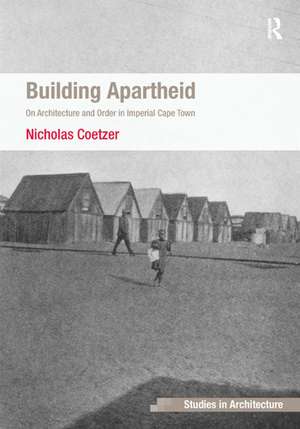Building Apartheid: On Architecture and Order in Imperial Cape Town
Autor Nicholas Coetzeren Limba Engleză Hardback – 26 iul 2013
Preț: 824.80 lei
Preț vechi: 1105.63 lei
-25% Nou
Puncte Express: 1237
Preț estimativ în valută:
157.84€ • 163.86$ • 131.62£
157.84€ • 163.86$ • 131.62£
Carte tipărită la comandă
Livrare economică 25 martie-08 aprilie
Preluare comenzi: 021 569.72.76
Specificații
ISBN-13: 9781409446040
ISBN-10: 1409446042
Pagini: 260
Ilustrații: Includes 72 b&w illustrations
Dimensiuni: 174 x 246 x 22 mm
Greutate: 0.73 kg
Ediția:New ed
Editura: Taylor & Francis
Colecția Routledge
Locul publicării:Oxford, United Kingdom
ISBN-10: 1409446042
Pagini: 260
Ilustrații: Includes 72 b&w illustrations
Dimensiuni: 174 x 246 x 22 mm
Greutate: 0.73 kg
Ediția:New ed
Editura: Taylor & Francis
Colecția Routledge
Locul publicării:Oxford, United Kingdom
Recenzii
A Baker & Taylor Academic Essentials Title in Area/Ethnic Studies: Black Studies outside the U.S. ’A younger generation of scholars is now rethinking the architectural history of South Africa, and with this book, Nic Coetzer proudly joins their ranks. He provides a fascinating yet chilling tale of how British Garden City planning and housing design played a role in racial segregation in Cape Town, creating appalling social problems which would have ramifications for decades after.’ Murray Fraser, UCL Bartlett School of Architecture, UK 'I recommend this book to all South African architects and architectural historians who have an interest in architecture and politics. Coetzer’s revisionist research about the origins of segregation will also enlighten all South Africans about the fantasy of the agents of Empire with its dire consequences.' The South African Journal of Art History
Cuprins
Chapter 1 The Agents of Empire; Part I Self/Countryside; Chapter 2 A Common Heritage/An Appropriated History; Chapter 3 Possessing the Land/Possessing the History; Part II Other/City; Chapter 4 From City to Cityscape; Chapter 5 Ascribing Otherness and the Threat to the Self; Part III Same/Suburb; Chapter 6 Models of the Self; Chapter 7 Distortions in the Mirror; Chapter 101 Conclusion; Chapter 102 Postscript;
Descriere
Through a specific architectural lens, this book exposes the role the British Empire played in the development of apartheid. Through reference to previously unexamined archival material, the book uncovers a myriad of mechanisms through which Empire laid the foundations onto which the edifice of apartheid was built. It unearths the significant role British architects and British architectural ideas played in facilitating white dominance and racial segregation in pre-apartheid Cape Town.
